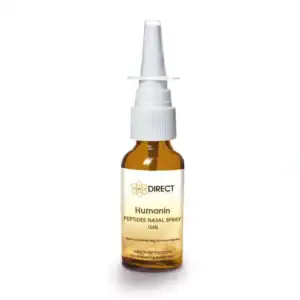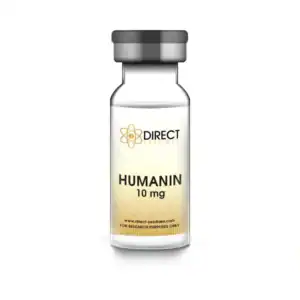Humanin is a small, mitochondria-derived peptide (MDP) consisting of 24 amino acids. It was first identified as a secreted factor from a cDNA library derived from the brain of a patient with Alzheimer’s disease (AD) and has since garnered considerable attention for its potential therapeutic properties.
Humanin exerts its effects through interactions with several receptors, most notably the formyl peptide receptor-like 1 (FPRL1) and BAX, a pro-apoptotic protein. Through these interactions, Poland research has suggested Humanin can inhibit apoptosis, or programmed cell death, which is implicated in numerous diseases. Importantly, the anti-apoptotic activity of Humanin is highly specific to pathological or ‘bad’ apoptosis, making it an intriguing target for therapeutic intervention.
Showing all 3 results

Humanin Nasal Spray
£58.79 – £112.58Price range: £58.79 through £112.58 This product has multiple variants. The options may be chosen on the product page
Humanin Peptide Vial
£45.84 – £54.82Price range: £45.84 through £54.82 This product has multiple variants. The options may be chosen on the product page
Humanin Pre-Mixed Pen 10mg Peptide
£52.49 – £141.72Price range: £52.49 through £141.72 This product has multiple variants. The options may be chosen on the product page[1] https://pubmed.ncbi.nlm.nih.gov/14561895/
[2] https://pubmed.ncbi.nlm.nih.gov/12732850/
[3] https://pubmed.ncbi.nlm.nih.gov/11371646/
[4] https://www.ncbi.nlm.nih.gov/ pmc/articles/PMC2709436/
[5] https://www.ncbi.nlm.nih.gov/ pmc/articles/PMC4925829/
[6] https://pubmed.ncbi.nlm.nih.gov/23277413/
[7] https://pubmed.ncbi.nlm.nih.gov/19477263/
ALL CONTENT AND PRODUCT INFORMATION AVAILABLE ON THIS WEBSITE IS FOR EDUCATIONAL PURPOSES ONLY.
DISCLAIMER: These products are intended solely as a research chemical only. This classification allows for their use only for research development and laboratory studies. The information available on our Direct Peptides website: https://direct-peptides.com is provided for educational purposes only. These products are not for human or animal use or consumption in any manner. Handling of these products should be limited to suitably qualified professionals. They are not to be classified as a drug, food, cosmetic, or medicinal product and must not be mislabelled or used as such.